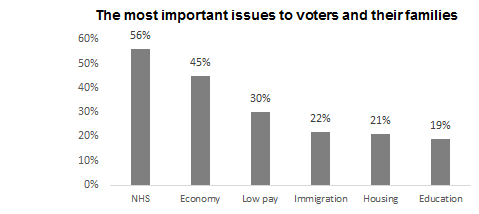The issues that matter to voters
The issues that matter to voters
Here, 56% of voters said that the NHS was one of the most important issues facing them and their families, followed by the economy (45%), low pay (30%) and immigration (22%) in relatively distant fourth place .

It’s interesting that each of the three parties polling the highest had their own issues that they were strong on.
For example, the Conservatives had a 22-point lead on the economy amongst those who said it was important for them and their family, while Labour had a 26-point lead on the issue of low pay. UKIP had a 21% lead over the Conservatives on the issue of race relations / immigration.

However, one of the surprises is still that Labour has only a narrow lead on health and the NHS of 6 points.
The most important issues and who is most trusted
Part of the explanation for why each party has a lead on each issue is because of the kind of voters who think each is important.
For example, younger working class voters, who are more likely to vote Labour regardless, thought the issue of low pay was important and hence are more likely to trust the party more. Similarly, older white voters, that are more likely to support UKIP anyway, most trusted the party on immigration.
On the other hand, a range of voters from all parties said that the NHS was important to them and their family, and in most cases they trusted their own party.

However, there were some interesting differences. For example, 94% of Tories who said the economy was an important issue for them personally said they most trusted the Conservatives, compared to only 72% of Labour supporters that said they most trusted their own party, which gives the Tories a wide lead.

Health and the NHS has been the most important issue to voters personally throughout the campaign
Opinium Research carried out an online survey of 1,956 GB adults aged 18+ from 28th to 30th April 2015. Results have been weighted to nationally representative criteria.




